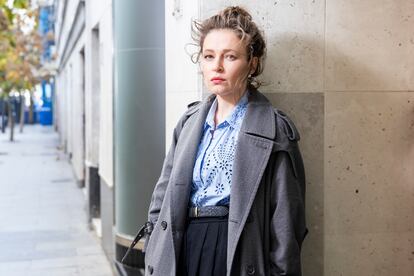Russian journalist Maria Pevchij: ‘Time is on Putin’s side in Ukraine’
The activist sees no end to the unrelenting authoritarianism and repression in her country

Maria Pevchij — journalist, activist and former associate of Russian opposition leader Alexei Navalny — recently visited Madrid to investigate the properties, yachts and other luxury assets of Russian oligarchs in Spain. “We’re on the hunt for Russian assets outside the country, and Spain happens to be one of the favorite places to invest corrupt Russian money,” she said in our interview. “In Malaga and Marbella, we saw mansion after mansion owned by Russians, and even a golf club owned by a deputy prime minister. Unfortunately, they were eagerly welcomed here until very recently. Nobody bothered to ask any questions,” said Pevchij, who is the director of the Anti-Corruption Foundation (FBK), an organization that was classified in 2019 as a “foreign agent” by the Russian government.
Pevchij was with Navalny when he was poisoned in 2020, and says she’s lucky to live in a “relatively” safe place in Europe now. “There’s no immediate danger to my life, but you know that Russia’s secret services are everywhere. It’s worrying because I have family in Moscow and I know they could be in danger.” Pevchij is pessimistic and believes the war is not going well for Ukraine. She’s also convinced that President Vladimir Putin will easily win the March 2024 elections, which he has not yet confirmed will take place.
Question. With limited progress and flagging Western support, the war is becoming increasingly tough for Ukraine.
Answer. Things are not going well. The Ukrainian government acknowledges that the counteroffensive is not producing the desired outcomes. Western financial and military support is decreasing. In Europe, countries like Slovakia are becoming more critical. And if Donald Trump is elected president again, it would be a disaster for Ukraine.
Q. Is Putin winning the war?
A. We need to talk about two wars. Putin’s attempt to take over Ukraine was unsuccessful in the short term. However, he will probably win a long-term war — time is on Putin’s side in Ukraine. Russia is now saying its people must prepare for a prolonged conflict. Putin has the power to completely restructure the Russian economy and allocate more money to military production. Additionally, Russia has created a society where human life holds little value. This means that, unlike Ukraine, it has almost unlimited numbers of people for its military forces.
Q. Have Western sanctions failed to work?
A. The predictions about the collapse of the Russian economy were reasonable, but they haven’t materialized. The Kremlin has found a way to salvage the economy and mitigate the impact of sanctions. The harshest sanction — the ban on Russian gas imports — hasn’t been implemented. Putin is currently having trouble acquiring weapons components and accessing foreign capital. However, the impact of the sanctions has not been severe enough to significantly hamper his war effort.
Q. There is talk of a new mass troop mobilization.
A. One of Putin’s major internal challenges is the mobilization of men under false pretenses — men who are now being told they won’t be able to return home. We now have protest movements led by mothers, sisters and other relatives of these soldiers, and discontent over this is very visible in Russia.
Q. What are the implications of a Russian victory in Ukraine?
A. As Putin’s continues to hold on to power, the magnitude of repression in Russia escalates exponentially. The entire opposition finds itself in prison. Just last week, the LGBTQ+ movement was unjustly labeled an extremist organization. And now there’s talk of banning abortion. Who knows what they’ll do next? Reinstate the death penalty? Putin’s unrelenting repression knows no bounds.
Q. How do you explain the Kremlin’s obsession over homosexuality?
A. It’s not an obsession — it’s a political calculation. Putin’s primary focus for the next elections is promoting family values and scoring points with conservatives. That’s why he’s now taking aim at abortion.
Q. After almost two years of war, have the Russian people gotten used to it?
A. Putin has held power for 23 years. An entire generation has grown up under his rule. Putin bombards the country with anti-Western propaganda, and accuses the United States of wanting to divide Russia. Change can only come from within, which is why we focus our efforts on internal politics. We don’t believe anyone from abroad will be able to impose democracy on Russia.
Q. Many Ukrainians say that this is not just Putin’s war, but Russia’s war. And they have criticized Navalny for sharing Putin’s imperialist ambitions.
A. It saddens me to hear such things because they are untrue. Navalny has consistently expressed his support for the Ukrainian borders of 1991, including Donbas and Crimea. I understand that Ukrainians may resent anything Russian, especially if their families have been hit by Russian missile attacks. However, I remain hopeful that in the future, there will be an opportunity to rebuild the relationship between the two peoples, even if it’s not in our lifetime.
Q. Do you expect any changes from the presidential elections next March?
A. They will be mostly symbolic and we already know the outcome. Putin will win 85% of the vote with 85% participation. We’re not optimistic about our ability to influence that outcome. However, we’ll use the weeks leading up to the election, when people are more receptive to political discourse, to provide as much information as possible. We’ll leverage all our resources to persuade the public that Putin is not a viable choice for the future.
Q. After receiving another 19-year prison sentence in August, is there any avenue for Navalny to influence the Russian political agenda?
A. The length of his sentence doesn’t matter. This time he got another 19 years. Next, he’ll be accused of terrorism and sentenced to another 35 years, and so on. He’s really looking at a life sentence. The real question is - whose life? Putin’s or Navalny’s? He’s only getting out when Putin goes down.
Q. What if Putin’s successor is worse?
A. Even so, a successor will need to make some gestures to show Russians that they have a new leader, like try to get the sanctions lifted in exchange for releasing some political prisoners.
Q. How is Navalny doing?
A. He finds himself in an extremely dire situation, enduring solitary confinement without any medical treatment at all. He’s in the hands of the same people who tried to poison and kill him. But we don’t have many details. His lawyers were recently detained and all our correspondence is censored. We’re only able to send him postcards with simple messages, and he can only reply, “I’m fine.” That’s it.
Sign up for our weekly newsletter to get more English-language news coverage from EL PAÍS USA Edition
Tu suscripción se está usando en otro dispositivo
¿Quieres añadir otro usuario a tu suscripción?
Si continúas leyendo en este dispositivo, no se podrá leer en el otro.
FlechaTu suscripción se está usando en otro dispositivo y solo puedes acceder a EL PAÍS desde un dispositivo a la vez.
Si quieres compartir tu cuenta, cambia tu suscripción a la modalidad Premium, así podrás añadir otro usuario. Cada uno accederá con su propia cuenta de email, lo que os permitirá personalizar vuestra experiencia en EL PAÍS.
¿Tienes una suscripción de empresa? Accede aquí para contratar más cuentas.
En el caso de no saber quién está usando tu cuenta, te recomendamos cambiar tu contraseña aquí.
Si decides continuar compartiendo tu cuenta, este mensaje se mostrará en tu dispositivo y en el de la otra persona que está usando tu cuenta de forma indefinida, afectando a tu experiencia de lectura. Puedes consultar aquí los términos y condiciones de la suscripción digital.









































